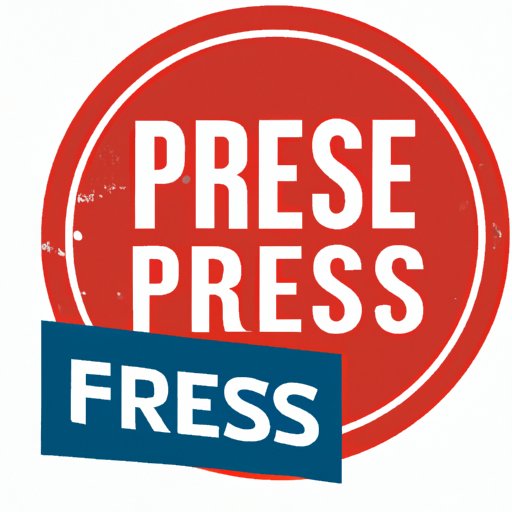
Introduction
Free press is an essential cornerstone of democratic societies, playing a crucial role in holding those in power accountable and ensuring government transparency. At its core, free press means the ability of news outlets and journalists to report on events and issues without censorship. In this article, we will delve into the history of free press, notable examples of journalists who have fought for its existence, the challenges it faces today, and ethical considerations of free press.
A brief history of the free press and its importance in a democratic society
The First Amendment of the United States Constitution protects freedom of the press. The amendment states, “Congress shall make no law respecting an establishment of religion, or prohibiting the free exercise thereof; or abridging the freedom of speech, or of the press; or the right of the people peaceably to assemble, and to petition the government for a redress of grievances.”
Similar constitutional protections exist around the world, serving as a guarantee of free speech and expression. The free press has had a significant impact on shaping history and democracy. It has exposed corruption, challenged authority, and brought about political change.
Notable examples of media outlets and journalists who have fought for the existence and independence of the free press
Journalists and news outlets have fought tirelessly to maintain the integrity and independence of the free press. Examples include journalists like Chinese journalist Gao Yu, who was sentenced to seven years in prison for her efforts to expose corruption within the government. In the United States, The Washington Post reporters who uncovered the Watergate scandal contributed to the downfall of President Nixon. The importance of supporting the efforts of journalists who face censorship or imprisonment cannot be overstated.
The challenges facing the free press today and ways to address them
The free press is facing unprecedented challenges today. Government censorship and corporate consolidation of media ownership threaten its ability to remain independent. Furthermore, the rise of fake news and disinformation has created a climate in which accurate reporting is often drowned out. One solution to these challenges is media literacy, which is the ability to critically evaluate news sources and determine their credibility. Supporting independent media outlets is another way to ensure the free press remains independent.
Free press vs propaganda: Recognizing and combating media bias
Factual reporting is essential for the free press to fulfill its role in holding the powerful accountable. Media bias can distort the truth and create misinformation. It can also stir up political polarization and social division. Recognizing media bias is an important step towards combating it. Some factors to consider when evaluating news sources include the sourcing of information, the use of language that may be inflammatory or biased, and the overall tone of the article. It is essential to seek out a variety of perspectives and news sources to avoid one-sided views.
The role of free press in holding the powerful accountable
Investigative reporting plays a critical role in holding those in power accountable. Journalists can expose corruption, mismanagement, and other abuses of power. An example of this occurred in 2019 when Reuters exposed the use of slave labor in the fishing industry in Southeast Asia, leading to international reform efforts. As citizens, it is our right and duty to stay informed and hold our elected officials accountable.
Ethical considerations of free press
Free press must also consider ethical considerations, such as the protection of sources. Revealing a source’s identity can pose a risk to their safety and can undermine the journalist’s integrity. Journalists may also need to balance press freedom with national security or public safety concerns.
Conclusion and call to action
The free press is a crucial part of democratic societies, fostering accountability, and transparency. However, it faces many threats, including censorship, propaganda, and consolidation. As responsible citizens, it is our duty to support independent media, stay informed, and promote the free press’s integrity. Through a commitment to media literacy and critical evaluation of news sources, we can combat misinformation and keep the free press alive.




